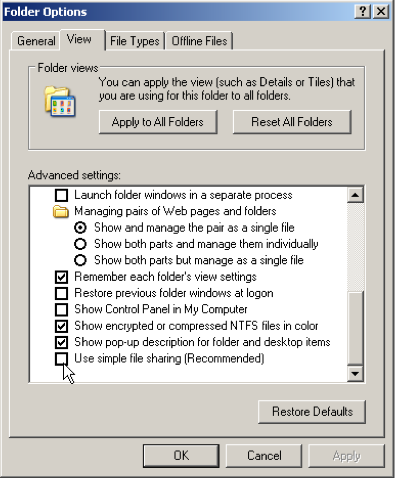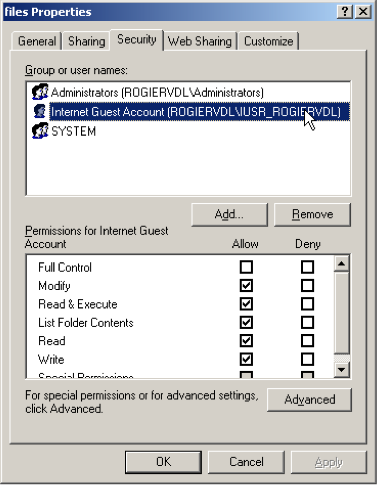Serverside Webscripting [JLW322]
05.files&folders
Before we jump in...
Permissions
-
In order to manipulate files/folders, the webserver needs permission to do so
- Linux and the like:
chmod -
Windows: NTFS permissions (disable simple file sharing!)


- Linux and the like:
open_basedir
-
PHP can restrict which directories you can access
- E.g. Websites residing in
C:\wamp\wwwhave no business inC:\
- E.g. Websites residing in
- In
php.initheopen_basedirsetting limits this -
If you try to read in a non-allowed path, PHP will tell you:
warning: file_get_contents() [function.file-get-contents]: open_basedir restriction in effect. File(/tmp/../a) is not within the allowed path(s): (/home/:/usr/lib/php:/usr/local/lib/php:/tmp) in /home/public_html/test.php on line 14.
post_max_size and upload_max_filesize
- PHP can restrict the filesize of a POST request and uploads
-
In
php.inithepost_max_sizeandupload_max_filesizesettings limit this-
post_max_sizelimits the size of a POST request, including files -
upload_max_filesizelimits the size of an uploaded file
-
Predefined Constants
-
DIRECTORY_SEPARATORis a predefined constant containing the directory separator\on Windows,/on *nix- Use of it is not mandatory as
/works fine on Windows too
Magic Constants
-
Getting to know the current directory of the PHP file
-
Oldskool:
./= current working directory (*)$myBaseDir = './'; -
Since PHP 4.2:
__FILE__= The full path and filename of the PHP file.$myBaseDir = dirname(__FILE__); -
Since PHP 5.3:
__DIR__= The full path of the PHP file.$myBaseDir = __DIR__;
-
Oldskool:
- → Use
__DIR__
Kicking it oldskool
Reading Files (1)
-
Available PHP functions
fopen()— Opens file or URL, returns a file pointer on successfread()— Binary-safe file readfwrite()— Binary-safe file writefgets()— Gets line from file pointerfseek()— Seeks on a file pointerfeof()— Tests for end-of-file on a file pointerrewind()— Rewind the position of a file pointerfclose()— Closes an open file pointer- …
- Combination of these needed to actually reading in a file
Reading Files (2)
-
Example
<?php // path to file (relative from this PHP file) $filename = __DIR__ . '/testfile.txt'; // open the file in read mode $handle = fopen($filename, 'r'); // file was opened, read in the contents if ($handle) { $contents = fread($handle, filesize($filename)); } else { // file not opened $contents = 'Error while opening file!'; } // close the filehandle fclose($handle); // output the fetched contents echo $contents; // EOF
Reading Files (3)
-
Example 2
<?php $handle = fopen(__DIR__ . '/testfile.txt', 'r'); if ($handle) { while (!feof($handle)) { $buffer = fgets($handle, 20); echo $buffer . '<br />' . PHP_EOL; } fclose($handle); } // EOF
More filereading
-
Get all lines of a file in an array using
file()<?php $lines = file(__DIR__ . '/testfile.txt'); // Loop through our array, show line and line numbers too. foreach ($lines as $line_num => $line) { echo '<strong>#' . $line_num . ':</strong> ' . $line . '<br />'; } -
Get the entire file contens using 1 command
<?php echo file_get_contents(__DIR__ . '/testfile.txt');
Writing files
-
Again a combination of
fopen()and a few other functions -
Or just use
file_put_contents()<?php file_put_contents(__DIR__ . '/testfile2.txt', 'hello!' . PHP_EOL);-
To update a file use
file_put_contents()with a flag<?php file_put_contents( __DIR__ . '/testfile2.txt', 'hello!' . PHP_EOL, FILE_APPEND );
-
To update a file use
File properties
-
Example
<?php $filename = __DIR__ . '/testfile.txt'; echo '<p>The file ' . $filename . (file_exists($filename) ? 'exists' : 'does not exist') . '</p>' . PHP_EOL; echo '<p>The file ' . $filename . ' was last modified on ' . date('Y-m-d H:i:s', filemtime($filename)) . '</p>' . PHP_EOL; echo '<p>The file ' . $filename . ' is ' . (is_dir($filename) ? '' : 'not') . ' a directory</p>' . PHP_EOL; echo '<p>The file ' . $filename . ' is ' . (is_file($filename) ? '' : 'not') . ' a file</p>' . PHP_EOL; echo '<p>The file ' . $filename . ' is ' . (is_link($filename) ? '' : 'not') . ' a shortcut</p>' . PHP_EOL;
File manipulation
-
Example
<?php // Copy file copy(__DIR__ . '/testfile.txt', __DIR__ . '/copiedfile.txt'); // Rename file // @note if the path differs you can move a file with this function! rename(__DIR__ . '/copiedfile.txt', __DIR__ . '/testfile2.txt'); // Delete file unlink(__DIR__ . '/testfile2.txt');
Listing directories
-
Example
<?php $myBaseDir = __DIR__; $dp = opendir($myBaseDir); // read base directory while (($file = readdir($dp)) !== false) { // exclude . and .. if ($file == '.') continue; if ($file == '..') continue; // we don't want directories if (is_dir($myBaseDir . '/' . $file)) continue; // output the filename echo $file . '<br />' . PHP_EOL; } // close base directory pointer closedir($dp);
Dealing with errors
-
Suppress errors with
@and stop the process when neccessary<?php $myBaseDir = __DIR__; $dp = @opendir($myBaseDir) or die('Error reading ' . $myBaseDir); ...
Out with the old, in with the new
SPL
- SPL = Standard PHP Library
- A collection of interfaces and classes that are meant to solve standard problems
-
Designed to traverse aggregate structures (anything you want to loop over)
- ... such as the lines of a file or directories
- Inluded in PHP since PHP 5.0
- Enabled by default since 5.3
SPL and files (1)
- SPL contains a
SPLFileInfoclass, an object oriented interface to information for an individual file (phpdocs) - SPL contains a
SplFileObjectclass — which extendsSPLFileInfo— an object oriented interface for an individual file (phpdocs)
→ Instead of using the oldskool functions, create an instance of this class and access the datamembers/ functions on it
SPL and files (2)
- Example (file info)
<?php $filename = __DIR__ . '/testfile.txt'; $fi = new SplFileInfo($filename); echo '<p>The file ' . $fi->getFileName() . ' was last modified on ' . date('Y-m-d H:i:s', $fi->getMTime()) . '</p>' . PHP_EOL; echo '<p>The file ' . $fi->getFileName() . ' is ' . ($fi->isDir() ? '' : 'not') . ' a directory</p>' . PHP_EOL; echo '<p>The file ' . $fi->getFileName() . ' is ' . ($fi->isFile() ? '' : 'not') . ' a file</p>' . PHP_EOL; echo '<p>The file ' . $fi->getFileName() . ' is ' . ($fi->isLink() ? '' : 'not') . ' a shortcut</p>' . PHP_EOL; // EOF
SPL and files (3)
- Example (file read)
<?php $lines = new SPLFileObject(__DIR__ . '/testfile.txt'); // Loop through our array, show line and line numbers too. foreach ($lines as $line_num => $line) { echo '<strong>#' . $line_num . ':</strong> ' . $line . '<br />' . PHP_EOL; } // EOF - Downside of
SplFileObject: it's line-oriented- → There's no
SplFileObject-version offile_get_contents()
- → There's no
SPL and directories
- SPL contains a
DirectoryIteratorclass — which extendsSPLFileInfo(!) — a simple interface for viewing the contents of filesystem directories (phpdocs) -
Example
<?php $myBaseDir = __DIR__; $di = new DirectoryIterator($myBaseDir); foreach ($di as $file) { // exclude . and .. + we don't want directories if (!$file->isDot() && !$file->isDir()) { echo $file . '<br />' . PHP_EOL; } } // EOF
Dealing with errors
-
If you try to access a file/folder that doesn't exist using the SPL classes, PHP will throw an
Exception<?php $di = new DirectoryIterator('/this/path/does/not/exist'); // EOF -
Use a
try/catchto properly handle it<?php try { $di = new DirectoryIterator('/this/path/does/not/exist'); } catch (Exception $e) { echo 'There was an error: <br />' . $e->getMessage(); } // EOF
Oldskool vs. SPL
Summary / What to use when?
-
Use the SPL classes for
- Looping directories →
DirectoryIterator - Fetching file info →
SplFileInfoandSplFileObject - Reading file contents line by line, Reading CSV files →
SplFileObject
- Looping directories →
-
Use the oldskool functions for
- Deleting files →
unlink() - Copying files →
copy() - Renaming/Moving files →
rename() - Fetching/Manipulating file contents (in its entirety) →
file_get_contents()andfile_put_contents()
- Deleting files →
File Uploads
Handling file uploads (1)
-
Files are uploaded to a temp location. You'll need to move them manually using
move_uploaded_file() -
PHP will populate a superglobal named
$_FILEScontaining that temp location per file.
Handling file uploads (2)
-
Example
<?php if (isset($_FILES['avatar'])) { echo '<p>Uploaded file: ' . $_FILES['avatar']['name'] . '</p>'; echo '<p>Temp location: ' . $_FILES['avatar']['tmp_name'] . '</p>'; echo '<p>Size: ' . $_FILES['avatar']['size'] . '</p>'; if (!in_array((new SplFileInfo($_FILES['avatar']['name']))->getExtension(), array('jpeg', 'jpg', 'png', 'gif'))) { exit('<p>Invalid extension. Only .jpeg, .jpg, .png or .gif allowed</p>'); } @move_uploaded_file($_FILES['avatar']['tmp_name'], __DIR__ . DIRECTORY_SEPARATOR . $_FILES['avatar']['name']) or die('<p>Error while saving file in the uploads folder</p>'); echo '<p><img src=' . $_FILES['avatar']['name'] . ' alt="" /><p>'; } ?> <form action="<?php echo $_SERVER['PHP_SELF'];?>" method="post" enctype="multipart/form-data" > <input type="file" name="avatar" id="avatar" /><input type="submit" /> </form>
Security / Best Practices
-
Provide a separate, dedicated folder to store all uploads in
- e.g.
files/ - Use subfolders where appropriate, e.g.
files/photoalbums/1andfiles/photoalbums/2
- e.g.
-
Rename files when moving them to prevent name conflicts
- e.g. give photos in photoalbums a sequential name such as
1.jpg,2.jpg, etc.
- e.g. give photos in photoalbums a sequential name such as
-
Always limit the allowed file extensions
- You don't want one to upload a
.phpfile, right?
- You don't want one to upload a
Questions?
Code summary
A code-only summary of this chapter is available at 05.files.and.folders.summary.html
Sources
- http://php.net/manual/en/ini.core.php#ini.open-basedir
- http://php.net/manual/en/ini.core.php#ini.upload-max-filesize
- http://php.net/manual/en/ini.core.php#ini.post-max-size
- http://php.net/manual/en/book.spl.php
- http://www.php.net/manual/en/class.splfileinfo.php
- http://www.php.net/manual/en/class.splfileobject.php
- http://www.php.net/manual/en/class.directoryiterator.php
- http://php.net/manual/en/language.constants.predefined.php